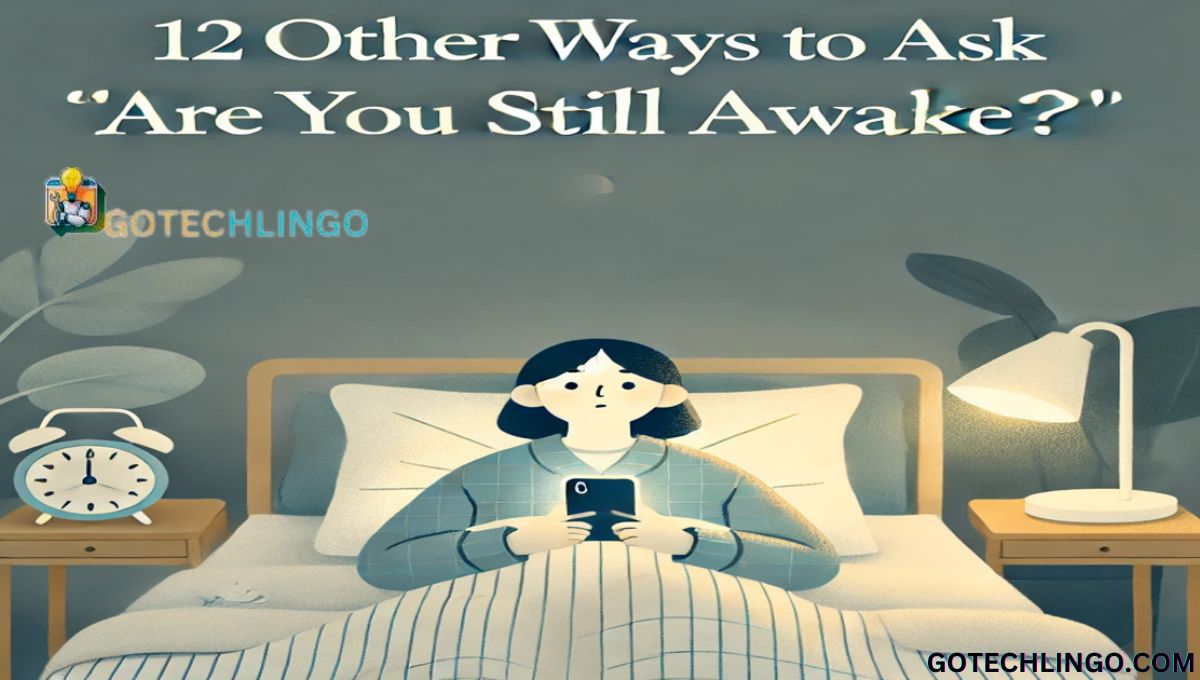Here is a table with 12 easy, short and informational steps about “Are You Still Awake?”:
| Step | Approach |
| 1 | Formal Alternative: “I hope I haven’t contacted you too late in the evening.” |
| 2 | Informal Approach: “Have you gone to bed yet?” |
| 3 | Casual Inquiry: “Still burning the midnight oil?” |
| 4 | Modern Check-In: “Are you still online?” |
| 5 | Polite Query: “Is bedtime still in the distance?” |
| 6 | Professional Tone: “Have you retired for the night?” |
| 7 | Relaxed Check: “Are you catching some Z’s?” |
| 8 | Relational Query: “Are you still up?” |
| 9 | Light-hearted Ask: “Have you hit the hay?” |
| 10 | Direct Question: “Can’t sleep yet?” |
| 11 | Friendly Check: “Are you snoozing yet?” |
| 12 | Expressive Inquiry: “Still wide awake?” |
Main Points
When it comes to checking in on someone’s alertness there are manyt ways to phrase the question behind the standard are you still awake? This can help your communication be lively, conversational and customto the specific context and relationship.
Formal Alternative: I Hope I Haven’t Contacted You Too Late

For a more polished, professional tone, you might say something like “I hope I haven’t contacted you too late in the evening.” This carries the same affection in a welll manner, acknowledging the possibility that your conversation partner may have already turned in for the night. It’s a polite way to check in without being arrogant.
Informal Approach: Have You Gone to Bed Yet?
Taking a more casual tack, you could simply ask “have you gone to bed yet?” This direct inquirey delete any dark while still balance an informal and conversational style. It’s a straight forward track to find out if the other person is still awake and available to chat.
It conveys a sense of comfort and familiarity that allows you to check in without feeling the need to be overly formal. Just be mindful of the relationship and ensure your tone matches the level of closeness you share.
Casual Inquiry: Still Burning the Midnight Oil?
Invoking the image of a late-night study or work session, “still burning the midnight oil?” is a whimsical way to check in on someone’s wakefulness. This casual inquiry has a lighthearted, playful quality to it.
This type of phrasing can work well in a variety of contexts, from checking in with a colleague who’s burning the candle at both ends, to catching up with a friend who’s been working overtime. It acknowledges the reality of late nights and long hours, while adding a touch of camaraderie and empathy.
The midnight oil metaphor taps into a shared experience that many can relate to, making it an accessible and relatable way to broach the topic of someone’s sleep or work habits. Just be mindful not to come across as overly judgmental or critical – the tone should be one of friendly concern rather than admonishment.
Modern Check-In: Are You Still Online?

In our increasingly digital world, you might frame the question as are you still online? This acknowledges the likelihood that your contact is engaged with technology even in the late hours. It recognizes the 24/7 nature of much of our work and social lives in the digital age.
This type of phrasing works particularly well when checking in with someone who you know to be an avid user of social media, messaging apps, or other online platforms. It assumes a level of connectivity that may keep them awake and active long after traditional bedtimes.
That said, be mindful that not everyone may appreciate the implication that they are tethered to their devices. Some may find it intrusive or even judgmental. So, it’s important to gauge the individual and their relationship to technology before deploying this particular phrasing.
Polite Query: Is Bedtime Still in the Distance?
Phrasing the question as is bedtime still in the distance? has a courteous, considerate tone, allowing your contact to respond without feeling pressured. It’s a gentler way to inquire about their wakefulness, without making any assumptions.
This type of wording works best in situations where you want to be respectful of someone’s schedule and boundaries. It communicates and spreads that bedtime is an important part of one’s routine and that you don’t want to impose on that. The polite and deferential tone can help put the other person at ease.
At the same time, the query still gets the point across – you’re curious to know if they’re still awake. It leaves the door open for them to respond honestly, without feeling any obligation to stay up. This can be especially useful when checking in with colleagues, elders, or others where a more formal, considerate approach is warranted.
Professional Tone: Have You Retired for the Night?
For a more formal, professional context, you could ask have you retired for the night? This polished phrasing signals respect for your contact’s schedule and boundaries. It acknowledges the late hour and the likelihood that they may have already concluded their day’s work.
This type of formal, restrained language is well-suited for business settings, formal events, or interactions with superiors, clients or other professional contacts. The retired for the night phrasing conveys a sense of deference, without being overly familiar or intrusive.
It’s important to match the level of formality to the situation at hand. In a casual, friendly context, this type of phrasing may come across as stiff or detached. But in a formal work environment, it helps maintain an appropriate degree of distance and respect between colleagues or business partners.
The key is to strike a balance between being thoughtful and direct. You want to check in on someone’s availability without making assumptions or overstepping boundaries. This formal, professional tone helps achieve that.
Relaxed Check: Are You Catching Some Z’s?
Taking a laid-back, playful approach, you might inquire, Are you catching some Z’s? – a colloquial way to ask about someone’s sleep status. This relaxed wording has a friendly vibe to it.
This type of formal and lighthearted language works well in informal settings when you’re checking in with close friends, family members with whom you have an easygoing rapport. This idiom taps into a shared understanding of the importance of sleep.
It’s important to match the tone to the relationship, however. When used correctly, though this relaxed check-in can help foster a sense of camaraderie and put the other person at ease. It acknowledges the late hour in a playful, good-natured way, rather than sounding overly serious or judgmental.
Relational Query: Are You Still Up?
Simply asking are you still up? conveys a casual, relational tone, potentially implying a closer connection between conversation partners. This phrasing assumes a degree of familiarity and comfort that lends itself well to informal, interpersonal contexts.
By preparing the question in this way that you’re not just inquiring about someone’s alertness you’re also checking in on their overall availability. The still up wording suggests an ongoing awareness of their routines which can signal a more significant connection.
This type of relational inquiry works best when chatting with close members, romantic partners or other individuals with whom you share a strong bond. It taps into a sense of shared experience and mutual understanding that goes apart from a basic exchange of information.
At the same time, it’s important not to overdo the connection angle. Using this phrasing with someone you don’t know well could come across as overly familiar. So standard the context and the nature of your connection before deploying this particular approach.
Light-hearted Ask: Have You Hit the Hay?
Invoking the agricultural image of hitting the hay this light-hearted question puts a fun spin on checking someone’s wakefulness. It’s a playful, whimsical way to inquire about their sleep status.
This type of phrasing works well in friendly contents where a bit of levity is appropriate. The “hit the hay” idiom taps into a shared cultural understanding of bedtime rituals and adds a touch of humor. It’s important to strike the right balance though.
Direct Question: Can’t Sleep Yet?
Cutting straight to the chase “can’t sleep yet?” directly addresses the core question in a clear, unambiguous manner. This type of direct phrasing works well when you want to get a quick, straightforward answer without any ambiguity.
They can’t sleep yet” query is well-suited for situations where you need a prompt, decisive response – for example, when coordinating a late-night work session or checking in on someone who you know has been struggling with insomnia. It removes any uncertainty or hedging and gets right to the heart of the matter.
Friendly Check: Are You Snoozing Yet?
Are you snoozing yet? Tell us about care and awareness for your rest and well-being. It’s a good-natured way to inquire about their current state of wakefulness. This type of wording works best in interpersonal contexts where you want to find someone without sounding overly uniquely.
The snoozing imagery taps into a shared understanding of the importance of sleep while the friendly tone signals an underlying concern for their overall wellness.
It’s important, however, not to overdo the friendliness. Used in a more formal or professional setting, this type of phrasing could come across as too casual or even patronizing. The key is to match the tone to the relationship and context at hand.
Expressive Inquiry: Still Wide Awake?
Expressing surprise or curiosity still wide awake? communicates an interest in your conversation partner’s current state of alertness. This phrasing has a slightly more emotive expressive quality to it compared to some of the more neutral queries we’ve discussed.
The “still wide awake?” The question works well when you genuinely want to understand what’s keeping someone up late or if you’re surprised to find them still active at an unusual hour.
In conversation with someone you’re close to the “still wide awake?” inquiry can foster a sense of understanding. It shows that you’re not just asking a perfect question but that you’re intelligently curious about their current state of being.
Frequently Asked Questions
What’s the difference between awake and awaken?
Are you still awake is the correct phrasing, as “awaken” is a verb meaning to become conscious or aware, rather than a state of being.
Is it correct to say “still awake”?
Yes, “still awake” is a grammatically correct and common way to inquire about someone’s current state of wakefulness.
How do you ask if you are still awake?
Some common ways to ask if someone is still awake include “Are you still awake, Have you gone to bed yet, and “Can’t sleep yet?”
Are you awake or are you up?
Are you awake and Are you up are both correct ways to ask about someone’s wakefulness with the latter implying they are not just conscious but also actively engaged.
Are you still up for meaning?
Are you still u means Are you still awake and available/ready to do something implying they have not yet gone to sleep.
Final Thought
In this era, the boundaries in our waking hours have become blurred. Many find themselves burning the midnight oil captivated by technology and the never-ending cycle of work. Are you still awake has become a commonplace inquiry and subtle check-in on our collective state of alertness.
We pose this question can have a significant impact on the tone and tenor of our interactions. The phrasing options at our disposal we can craft more personalized, considerate ways to connect with those around us, even in the late hours of the night.
Ultimately, finding the right words to ask if you are still awake can help foster deeper understanding, empathy and a sense of shared experience qualities that are all the more precious in our increasingly fast-paced, technology-driven world.



